I\’d like to say that it\’s shame that the Talking Heads didn\’t hit their height of commercial success until 1983, after they made the two best albums they were ever going to make, but Fear of Music and Remain and Light have rightfully gotten the accolades and widespread mainstream attention they deserve anyway. So I\’ll save my pitying for bands that never got the critical acclaim they deserved, like Cardiacs. Go listen to Cardiacs.
Up until now I\’d describe the Talking Heads\’ music as \”cute\”, but finally with Fear of Music they introduce a little bit of a gloomy, sinister edge to undercut the usual pleasant slice-of-life lyrical minutiae. Just a little bit, mind you. Take a look at their band photos again when you get a chance, they certainly don\’t ever exude an air of psychological torment or oppression. And why should they, these WASPy New England-educated motherfuckers? No, there are no real demons here, this is more of an exercise in experimenting with the dystopian mindset. And it\’s about damn time, too, because now the Talking Heads have an album that actually feels important thanks to its weighty, moody presentation and disposition.
Let\’s start with the previously mentioned \”I Zimbra\”, which thematically sticks out like a sore thumb compared with the rest of the songs to follow, but nevertheless wouldn\’t belong anywhere else but as the opener to the Talking Heads\’ Fear of Music album, right? As it turns out, this is unquestionably the most important track here, where the band is joined by real African musicians playing actual African rhythms on genuine African instruments with…lyrics whose words are taken straight from a 1916 Dadaist nonsense poem by German guy Hugo Ball. OK, so it\’s not entirely African, But the real key here is the incorporation of the African stuff with the aesthetics of Westernized music, which wasn\’t really happening yet in mainstream rock in 1979. The Talking Heads would start becoming obsessed with world music in the upcoming albums, but they nail it pretty well getting their feet wet with \”I Zimbra\”.
Next come the tracks that actually present the album\’s concept: stick \”Fear of\” in front of most of these song titles and you\’ll certainly get the gist of what they\’re going for here. Byrne mutters nervously during the sinister-in-its-innocuousness \”Mind\”, which chugs along on a relatively low-energy groove. And speaking of Joy Division, \”Paper\” is reminiscent of the dancier tracks off of Unknown Pleasures (which was only released two months earlier than Fear of Music, by the way) and a lot less bleak. The jangly guitars do sound as if they\’re being played in the darkness at the end of the universe, which is obviously by default much cooler than any jangly guitar section off of More Songs…, objectively. \”Paper\” is a gem that is thoroughly underrated, and my personal favorite on the album. I used to think it was about marriage (the proverbial piece of paper), but who knows? These artsy lyrics go right over my puny little head.
DID YOU CATCH THE PART WHERE I BARELY HAD ANYTHING TO SAY ABOUT \”MIND\”? SHHHHH…
\”Cities\” is almost agoraphobic the way the frantic beat fades in at the beginning, as if the rhythm is out of control and spilling out infinitely in all directions. Consider this song a spiritual successor to Talking Heads: 77\’s \”Don\’t Worry About the Government\”, or More Songs…\’s \”The Big Country\”. It\’s another song about guy trying to carve out a place in the world he can call his own. Except, in this case, it seems more like Byrne is teetering on the brink of mental collapse trying to carve that place out before it\’s too late (\”I\’m checking them out, I\’m checking them out/I got it figured out, I got it figured out/There\’s good points, some bad points/But it all works out, I\’m a little freaked out/Find a city, find myself a city to live in/I will find a city, find myself a city to live in\”).
\”Life During Wartime\” is one of the Heads\’ more well-known songs, with a very persistent and danceable groove (and the Stop Making Sense concert-documentary version of this song features one of my very favorite David Byrne dances of all time). I really like this one! My interpretation of the song is that he\’s using music to talk about how unimportant music is when one is primarily focused on day-to-day civilian survival during a war. Maybe! But what the fuck does David Fucking Byrne know about this, anyway? The guy probably lives in a giant Fabergé egg.
\”Memories Can\’t Wait\” is a cool sonic departure from the usual fare, very gothy in its desolate, wall-of-sound presentation that switches to beautiful, calm-before-the-storm introspection during some of the verses. Again, like almost all the other tracks on Fear of Music, every nook and cranny is replete with desperation and paranoia. I believe this one is about the mania of being trapped in one\’s own head, constantly thinking and obsessing with no Off switch. The way Byrne belts out \”These memories can\’t waaaaaaaaaaiiiiittt!\” at the end is haunting. For me, anyway. Maybe for you it sounds like dog shit!
\”Air\” is a cool song! Let\’s move on!
\”Heaven\” is another haunting tune that takes the concept of Heaven, turns it into a metaphor about going to a bar, and still makes Heaven sound really eerie and unsettling without saying anything that people don\’t already know about Heaven. Genius! The dreamy chorus with \”Heaven…Heaven is a place….A place where nothing…Nothing ever happens\” is positively ethereal, and not in a good way. Kind of in a fever dream way instead. And there\’s nothing overtly sinister about the song, it\’s all very subtle, but man is it effective. Do a lot with a little, I always say! About my penis! HA!
\”Animals\” is angsty! I mean, right off the bat you get a very convictive \”I\’m mad!/And that\’s a fact!\” from Byrne\’s weenie-voice. \”I found out that animals don\’t help!\” comes next. And you can probably guess at this point that most of the rest of the song is going to be petty weirdo gripes about animals, almost like it\’s out of jealousy, and it\’s hilarious. Musically minimalistic stripped-down jangle-punk with odd time signatures, but each note still packs a punch and hits you right in your ugly face.
\”Electric Guitar\” is perhaps the one weak track on here, and possibly the most forgettable. Nice use of tuba, though. Is the song a comment on the gravitation toward synthesizers in popular music during the very late \’70s, eschewing electric guitar? A comment on the negative attitude toward rock music in general? Is it about an actual walking, talking electric guitar? The following 40,000 words delve deeper into this topic, and-
OK, the album ends on a somber, droney note with \”Drugs\”. In typical Eno fashion, just as with almost every album he had produced by any artist or band, including his solo work, the end of the album is SULLIED and RUINED with some dull, dull, dull dull dull 5-minute meandering sound collage! But not really, this is a good one. The emotion of the song is still panicked, still antsy and scrambling like everything that came before it, but it\’s subdued. Helpless. Numb. Almost like giving up. Fun little electronic blips and percussive thwaks dot the landscape of the slow, plodding, pernicious rhythm. Occasional crescendos peter off back to equilibrium. Finally, at the end, like a final gasp of air, a crunchy, abrasive, gloomy guitar solo closes out the album as it fades to nothingness.
Nifty, eh?! Fear of Music has the characteristics of a transitional album, but executed with such care and obsessive-compulsive precision that, released in August of 1979, it ekes out as one of the best albums of the decade. Don\’t listen to other things right now, listen to this instead. Except maybe Cardiacs.

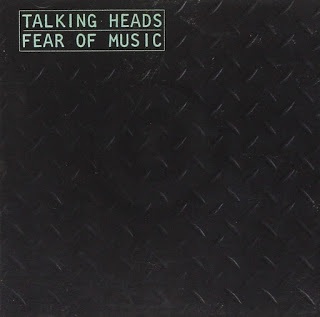


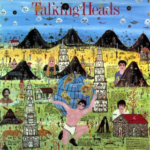
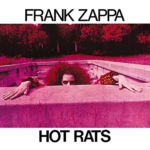
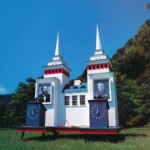

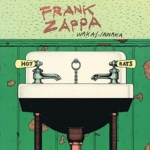
Click here to ridicule this post!